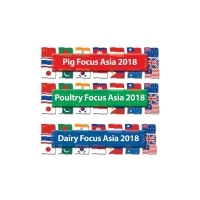
Traditionally this year in March the VIV Asia Exhibition and conference were organized in Bangkok. The feed expert of Dr Bata Ltd, Dr Jozsef Gyenis was asked for a lecture with the title of “Heroic fight against Gram positive bacteria in the poultry industry”
Gram positive pathogens, such as Clostridium perfringens occur worldwide and can cause serious economic losses in poultry production. Throughout the last decades, the antimicrobial susceptibility of the pathogens decreased significantly, majority of the exposed farms experience antibiotic resistance. The current presentation reviews the available natural feed alternatives in poultry production. In order to fulfill the growing demand for organic, antibiotic free meat production, our research team has developed a microbial kit for characterizing Clostridium perfringens isolates from different locations for commonly available antibiotic resistances and to compare with natural anti-clostridia feed additive alternatives
Phytobiotics can address gut health challenges in the poultry industry and can be used as novel growth promoters. Traditional herbs play an important role in eliminating pathogenic infections, represent a novel solution for antibiotic resistance at an affordable price and serve the consumer’s need for antibiotic free production. Combining herbal plant extracts with an optimal prebiotic allows products to work through multiple modes of action and ensures normal growth of the commensal microflora while inhibiting the growth of undesired pathogens and enhancing production parameters. The aim of this research project was to develop a natural growth promoter which has a selective inhibiting effect on the Gram positive pathogenic bacterial infections (C. perfringens); without limiting the multiplication of the normal microflora. Parallel, antibiotic sensitivity of various Clostridium perfringens field isolates were also monitored using Lyncomycin, Streptomycin, Tetracycline, Tylosin and Enrofloxacin and compared with the selective inhibiting effect of phytobiotics. Majority of the tested antibiotics showed high minimal inhibition concentrations against the isolates suggesting limited efficacy and high resistance. Optimal plant extract mixtures combined with prebiotics showed effective MIC values and low variation in between isolates, without having any effect on the normal microbiome.
In vivo testing for determining the phytobiotic/prebiotic combination’s efficacy was done on commercial broiler chicken farms in both China and Latin America. Results showed that in experimental trials production parameters were significantly improved and incidence of necrotic enteritis was reduced in groups that received the phytobiotic/prebiotic included in the diet compared to the non-treated groups. Metagenomic analysis revealed that the phytobiotic/prebiotic inhibits the growth of C. perfringens in the small intestine, the product does not influence the growth of C. perfringens in the large intestine, and therefore ensures optimal butyric acid production in the large intestine.
backNatural herb countaining feed additive for swine
Feed additive against the negative effects of mycotoxins for swine
Natural phytobiotic combination for poultry
A polysaccharidose enzyme containing feed supplement for ruminants
A probiotic innovation for the optimal microbiom
A natural phytobiotic, prebiotic combination for maintaining gut balance
Bioavailable minerals